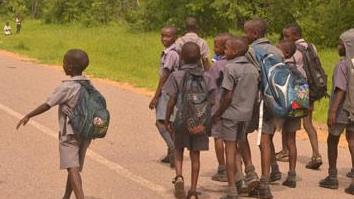
KWEKWE — Most students in rural schools are condemned to failure owing to the government’s neglect of schools and nonexistence of infrastructure to support learning in most of the institutions.
REPORT BY BLESSED MHLANGA
At Zibomvu Secondary School, with an enrolment of 198 students, only one classroom block stands as part of the learning infrastructure. There is a staff complement of just five teachers, some of them forced to take three subjects across all forms.
During a visit to the school by Education minister David Coltart, students in two different classes sat side by side as they learnt in the open despite freezing temperatures.
Silobela legislator Anadu Silulu said there was hardly any learning at the school during the rainy season because all the students and teachers would be forced into the single classroom at the school, to hide from the rain.
“Imagine having 198 students in one classroom taking shelter from the harsh weather! No learning would take place. Most of the time it rains it means we lose valuable time and would not be able to cover the syllabus on time,” he said.
The pass rate at the school is very low, in fact, only one pupil out of 20 manages to pass with the required five “O” Level subjects.
At Brooms Groove Primary School, a scenario that has become a common feature in most rural schools obtains. Teachers are forced to take three classes in one go.
- Chamisa under fire over US$120K donation
- Mavhunga puts DeMbare into Chibuku quarterfinals
- Pension funds bet on Cabora Bassa oilfields
- Councils defy govt fire tender directive
Keep Reading
Acting headmistress Fungai Mari has in her combined class 32 pupils from Grades 0, 1 and 2 all bundled in the same class, needing to learn different concepts from the same teacher at the same time. The school, which is 29km from Kwekwe, has a staff complement of just three teachers teaching Grades 1 to 7 between them.
“When I teach, I tell them that what I am saying now is for Grade 0 please listen. This will be after I give the other grades work to do,” she said.
Timpson Moyo from Silobela Ward 25 said there was a gap in the education system between rural and urban schools, which would take centuries to mend.
“Our children just go to school so that they learn the basics of reading and writing. We do not really expect them to pass because the conditions for passing are just not there,” he said. “Teachers do not want to stay at the school. Every year we have a new teacher or sometimes no teacher at all.”
Stanley Ndlovu said some of the students finished school without even grasping the basics of education.
“Some of these students cannot even read or write and to see these levels of ignorance in schools 33 years after independence is just shocking and disappointing,” he said. “We are trapped in a vicious circle, where we know our children will never escape this life of poverty. They go to school to fail and then become herd boys never escaping this life.”
The enduring story of former Gandavaroyi Primary School headmaster Peter Chihiya who wrote Grade 7 national examinations for 32 pupils at his Gokwe school, in an attempt to have someone passing from his school, made sad reading.
Chihiya was smoked out, arrested and found guilty of fraud. He was sentenced to 20 months in prison.
Eight of those months were suspended on condition of good behaviour, while the other 12 months were set aside on condition he carried out 420 hours of community service. In a letter of apology to the Zimbabwe Schools Examination Council (Zimsec), which was presented in court as part of his mitigation, Chihiya apologised for his wayward behaviour saying he was only tempted into the offence with the hope of improving the pass rate at the school.
“First and foremost, I would like to apologise to Zimsec and the children of Gandavaroyi,” he wrote. “I am really sorry. I did not intend to do so, but I got tempted in an effort to improve the pass rate at the school. I blame no one but myself for these actions.”
Chihiya was embarrassed that the school always recorded 0% pass rates and he thought to avoid embarrassment, he should write the exams himself.
Coltart, while addressing teachers and villagers at Xavier Sibangani Primary School during a tour of Silobela and Zhombe rural schools, said the education system was littered with illiterate pupils who were just passing through the system. Coltart placed blame on his government for failing to provide adequate resources to schools and supporting infrastructure to uplift learning standards, especially in rural areas.
“This is reflected in the results of most of our secondary schools, especially in rural areas where conditions for teachers are deplorable and therefore, not attracting the best brains in the teaching field,” he said.
Politics has also been at the centre of disturbing education, with teachers viewed as MDC supporters being hounded out of schools during election time. Coltart said this should be stopped and teachers protected.
“Schools are not the place for politics. Party politics should stay away from our schools because they affect the education of our children,” he said.
The Education ministry in partnership with Unicef launched an education transition fund which in phase one saw the provision of textbooks in schools. The second phase saw an injection of $62 million towards rehabilitating and building new infrastructure in disadvantaged schools.
However, with elections set for July 31, many fear the transitional fund would evaporate if polls were to be disputed and most in the rural areas who hoped to see their children one day access quality education keep would just their fingers crossed.










